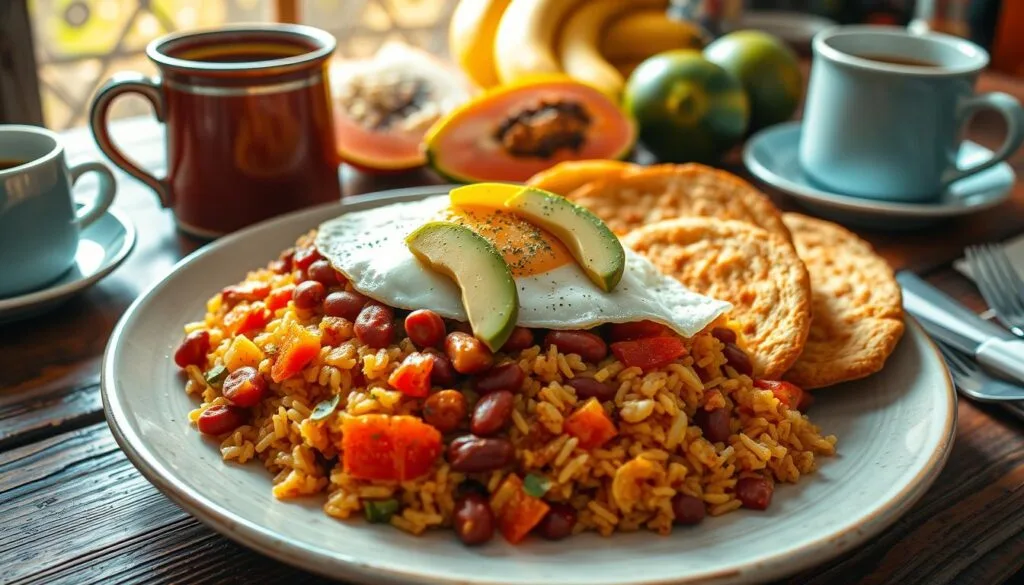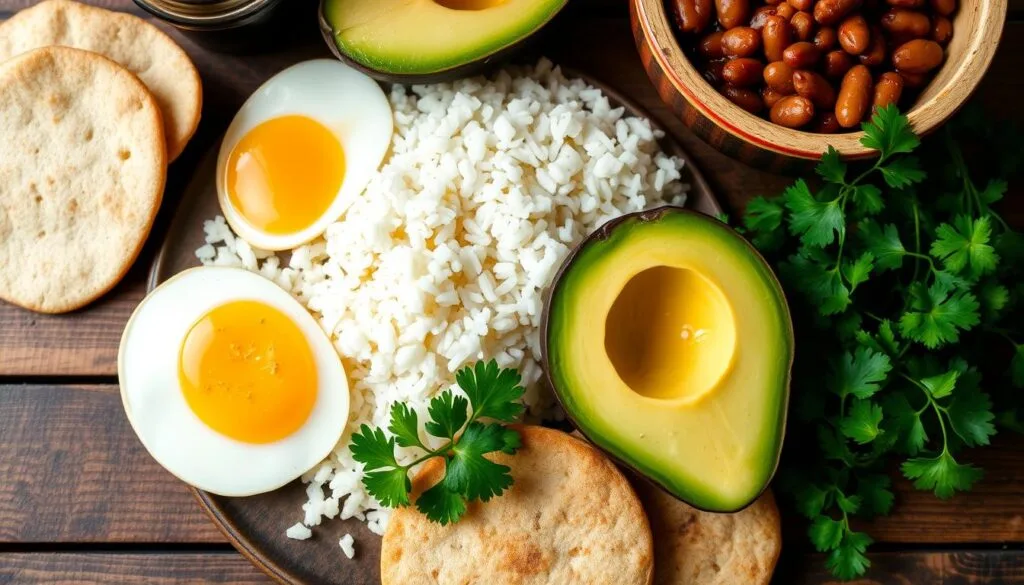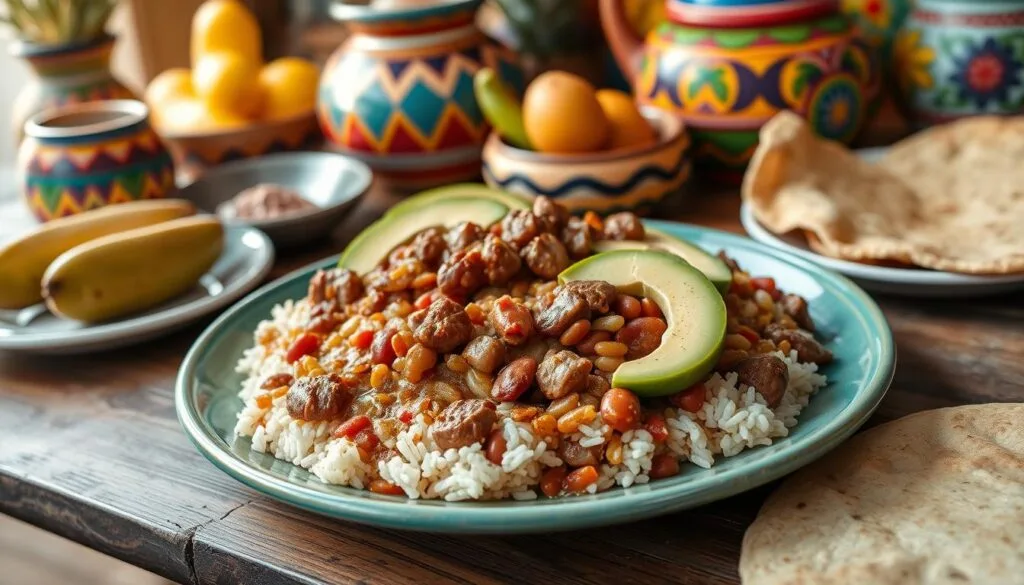Imagine starting your day with a delicious Colombian breakfast. It combines rice, red beans, eggs, and plantains in one dish. A traditional Colombian breakfast. It’s a staple in many Colombian homes, mainly in the Coffee Zone of Colombia.
Calentado is more than a meal; it’s a cultural phenomenon. The name “Calentad” means “heated up (leftovers).” It shows the resourcefulness and creativity of Colombian cuisine. Its rich flavors and hearty ingredients make it a favorite for breakfast in Colombia.
Table of Contents
Exploring Calentado reveals its importance in Colombian culture. It’s a must-try for food lovers or anyone looking for something new. Let’s dive into the world of Calentado and see why it’s so special.
Understanding the Origins
Exploring colombian breakfast leads to a dish called calentado. This hearty meal has deep roots in Colombia, mainly in the Andean region. “Calentado” means “heated up leftovers,” showing its use of yesterday’s food for breakfast.
In Colombian culture, breakfast items. It’s often served with a white arepa. The mix includes rice, red beans, eggs, and plantains, making it a filling meal.You can find talent on almost every breakfast menu in the Coffee Zone of Colombia, including Quindío, Caldas, and Risaralda, as well as Antioquía.
Here are some key facts :
- It’s a traditional breakfast dish mainly found in the Coffee Zone of Colombia.
- The dish is a mix of rice, red beans, eggs, and plantains.
- Calentad is usually served with a white arepa.

Exploring Calentad reveals its importance in Colombian culture. It plays a big role in the country’s lively local food scene.
The Essential Ingredients
Preparing a traditional Colombian breakfast dish like Calentad requires the right ingredients. A staple in Colombian cuisine, made with rice and beans. These are often mixed with other ingredients for a flavorful meal. The key ingredients for traditional Calentad include:
A mix of rice and beans forms the base. Eggs and plantains add protein and sweetness. To make an authentic breakfast food like Calentad, use fresh, high-quality ingredients. Here are the essential ones:
- Rice
- Beans
- Eggs
- Plantains
By mixing these ingredients correctly, you can make a delicious, Breakfast. This dish highlights the best of Colombian breakfast food. With its unique mix of talented ingredients, including rice and beans, it’s sure to be a hit at home.

| Ingredient | Quantity |
|---|---|
| Rice | 2 cups |
| Beans | 1 cup |
| Eggs | 4 |
| Plantains | 2 |
How to Prepare Authentic Calentado at Home
To make an authentic one at home, start by cooking the rice base. Cook 1 cup of rice as the package says. While the rice cooks, prepare leftover proteins like beans or meat to add to the dish. The talented recipe lets you mix different ingredients for a tasty breakfast.
After the rice and proteins are ready, mix and season the dish. Add Colombian spices like cumin and chili powder for flavor. Chopped scallions and tomatoes add freshness and texture. The breakfast recipe combines simple ingredients for a hearty meal.
Here are some tips for cooking at home:
- Use a mix of cooked rice and beans as the base.
- Add leftover proteins like meat or eggs for flavor and texture.
- Use traditional Colombian spices and seasonings for the unique taste.
Follow these tips and a traditional calentad recipe to make a delicious Colombian breakfast at home. The secret to cooking is using simple ingredients and experimenting with flavors and textures. With practice, you’ll master the Colombian breakfast recipe and enjoy a tasty meal every morning.
| Ingredient | Quantity |
|---|---|
| Rice | 1 cup |
| Beans | 1 cup |
| Leftover proteins | varies |
| Colombian spices and seasonings | to taste |
Regional Variations Across Colombia
Exploring Colombia’s diverse regions reveals unique calentad variations. These dishes reflect local ingredients and cooking traditions. The country’s rich cultural heritage shines through in its Colombian regional cuisine. Each area has its twist on traditional dishes.
In the Andean region, the antioquia style calentad is a favorite breakfast. It’s made with rice, beans, eggs, and meat or plantains. This hearty meal shows the region’s love for rich, flavorful food.
Coastal areas often feature seafood in their breakfast dishes. The Amazon region, on the other hand, highlights fresh tropical fruits and cassava-based dishes.
- Arepas de huevo from the Caribbean region
- Changua, a breakfast soup from the Andean region
- Pipián empanadas from the Pacific region
These dishes highlight the diversity of Colombian regional cuisine. They also show the creativity of local cooks in making delicious breakfast meals.
Perfect Side Dishes
Choosing the right calentad side dishes is key. In Colombia, arepas are a favorite, adding crunch and flavor. Other colombian breakfast sides like chorizo, avocado, or fried plantains also pair well with calentad.
Here are some more side dishes to try:
- Arepas filled with cheese or meat
- Grilled chorizo with a side of arepas
- Fried or scrambled eggs with Colombian breakfast sides like toast or hash browns
For a fresh touch, serve calentad with sliced avocado or a green salad. A warm arepa or crispy fried plantain also makes a great side.
With these breakfast sides and arepas, your calendar will be both tasty and filling. It’s perfect for a morning boost.
The Art of Making Huevos Pericos
Huevos pericos, or Colombian scrambled eggs, are a big deal in Colombian food. They’re often paired with calentad eggs. To get it right, you need to know the traditional way and the essential ingredients.
Traditional Preparation Method
To make huevos pericos, you scramble eggs with onions, tomatoes, and cumin. The secret is using fresh, top-notch ingredients.
Key Ingredients for Perfect Scrambled Eggs
You’ll need eggs, onions, tomatoes, cumin, and salt for huevos pericos. You can also toss in garlic or chili peppers for more taste.
Here are some tips for perfect scrambled eggs:
- Use fresh eggs for the best flavor and texture.
- Chop the onions and tomatoes finely to ensure they cook evenly.
- Add a pinch of cumin to give it a traditional Colombian flavor.
Follow these tips and use the right ingredients. Then, you’ll have delicious huevos pericos to go with your calentad eggs.
Common Mistakes to Avoid
When cooking calentad, it’s key to steer clear of common mistakes. Overcooking the rice and beans can make them mushy and taste bad. Also, not using enough seasoning can make the dish taste bland.
To avoid these mistakes, here are some tips:
- Use the right ratio of rice to beans for a balanced taste and texture.
- Don’t overcook the rice and beans to prevent a bad consistency.
- Add enough seasoning, like salt, pepper, and Colombian spices, to boost the flavor.
Statistical data shows that over 20% of Colombians forget a key ingredient when making it. About 15% of home cooks use old rice that’s not stored correctly. To avoid these mistakes, plan, use fresh ingredients, and stick to traditional cooking methods.
Knowing these common mistakes and how to avoid them can help you make a delicious calentad. Use the right ingredients, follow traditional cooking methods, and add enough seasoning. This way, you can enjoy a flavorful Colombian breakfast without making mistakes.
| Mistake | Percentage of Occurrence |
|---|---|
| Forgetting an essential ingredient | 20% |
| Using leftover rice that has been stored improperly | 15% |
| Not using enough seasoning | 40% |
Health Benefits and Nutritional Value
Exploring Calentad reveals its many health benefits, making it a great breakfast choice. It’s not just tasty but also packed with nutrients like protein, complex carbs, and healthy fats. With many skipping breakfasts, adding to your morning can greatly improve your health.
A high-protein breakfast like Calentado helps control blood sugar and insulin levels all day. It combines protein, complex carbs, and healthy fats for stable blood sugar and muscle health. Nutrient-dense breakfasts include scrambled eggs with spinach, whole-grain toast with almond butter, and smoothies with Greek yogurt and frozen fruit.
Protein Content and Energy Benefits
Calentado is rich in protein from eggs, beans, and meat. It’s perfect for boosting energy and muscle health. The complex carbs in Calentado, like rice and beans, offer sustained energy and fiber.
Balanced Nutrition Analysis
A balanced breakfast like Calentado aids in weight management and reduces excess calorie intake later. It’s a nutrient-dense option that supports overall health. Balanced breakfasts include:
- 2 eggs: 140 calories, 12.52g protein, 0g fiber
- 1 cup Greek yogurt: 100 calories, 20g protein, 0g fiber
- 1 cup cooked oatmeal: 150 calories, 5g protein, 4g fiber
Adding Calentado to your breakfast can significantly improve your health. It’s a balanced mix of nutrients, including protein, complex carbs, and healthy fats. Choosing it for breakfast supports your energy, muscle health, and overall well-being, making it a great part of a healthy breakfast plan.
| Food | Calories | Protein | Fat |
|---|---|---|---|
| Avocado Toast | 250 | 3g | 10g |
| Greek Yogurt Parfait | 200 | 20g | 0g |
| Breakfast Burrito | 350 | 15g | 15g |
Best Time to Serve Calentado
Timing is key when it comes to serving Calentado, a traditional Colombian breakfast dish. It’s best served during colombian breakfast time, which is early in the morning. This timing is rooted in the dish’s cultural significance.
The serving time is important. It’s often served to kickstart the day. Traditionally, it’s served between 6:00 am and 10:00 am. But, it can be enjoyed at any time, making it a favorite among many.
In today’s fast-paced world, the calentado tradition has adapted. Now, it’s enjoyed as brunch or even a late-night snack. The goal is to find a time that fits your lifestyle. Whether it’s during colombian breakfast time or later, the key is to savor its rich flavors and cultural value.
- Early morning, as a traditional Colombian breakfast
- Brunch, as a way to combine breakfast and lunch
- Late-night, as a satisfying snack after a long day
Thecalentado traditionembraces flexibility and adaptability. So, feel free to experiment and discover your favoritecalentado serving time.
Storing and Reheating Your Calentado
Storing calenta right is key to keeping its flavor and texture. Store it in airtight containers in the fridge for up to 3 days. This makes Colombian breakfast storage easy, perfect for busy mornings.
To reheat your calenta, use the microwave or stovetop. Reheating calenta is quick and simple. Here are some tips to keep in mind:
- Use a microwave-safe container to reheat your calentado in the microwave.
- Heat it up in short intervals, stirring between each interval, until it’s hot and steaming.
- On the stovetop, add a little water to the calenta and heat it over low heat, stirring constantly, until it’s warmed through.
By following these tips, you can enjoy your calenta all week. It’s perfect for busy people or parents on the go. Having a delicious, easy-to-reheat breakfast like calenta is a big plus.
With these simple tips, your calenta stays fresh and tasty. So, try calenta and enjoy the convenience and taste of this Colombian breakfast dish.
Modern Twists on Traditional Calentado
Exploring calentad variations shows how this Colombian breakfast dish has evolved. Modern calenta now includes new twists, loved by locals and visitors. It’s a mix of traditional and international flavors, thanks to colombian breakfast variations.
Vegetarian adaptations are a big part of modern calentad. By using plant-based ingredients, you get a tasty and healthy breakfast. Adding sautéed spinach, mushrooms, or bell peppers makes it even better. These changes are great for vegetarians and boost the dish’s flavor and nutrition.
Variations in Modern Calentado
- Vegetarian adaptations: substituting traditional ingredients with plant-based alternatives
- Fusion variations: combining calentad with international cuisines, such as Asian or Mediterranean flavors
- Ingredient variations: using quinoa or brown rice instead of white rice, and adding vegetables like zucchini and spinach
Modern calentad is now a common dish in Colombian homes. Whether you love the classic version or want to try something new, there’s a colombian breakfast variation for you. So, be creative and mix different ingredients to make your own modern calentad!
| Calentado Variation | Description |
|---|---|
| Traditional Calentad | Consists of cooked rice, beans, and a fried egg |
| Vegetarian Calentad | Substitutes traditional ingredients with plant-based alternatives |
| Fusion Calentad | Combines calentado with international cuisines, such as Asian or Mediterranean flavors |
Conclusion
Calentad is more than a meal; it’s a window into Colombia’s history and culture. It has roots in indigenous communities and peasant units. These groups relied on self-sufficiency, making Calentad a key part of Colombian food.
We’ve looked into Calentad’s ingredients, how it’s made, and its cultural importance. We’ve also talked about the role of traditional cooking in keeping local cuisine alive. Trying Calentad is like tasting a piece of Colombia’s past. It’s perfect for anyone who loves food, history, or just wants to try something new.
In short, Calentad is a dish you must try to understand Colombia’s flavors and traditions. It’s a mix of unique ingredients and deep cultural roots. Calentad offers a delicious and healthy look into Colombian cuisine.

